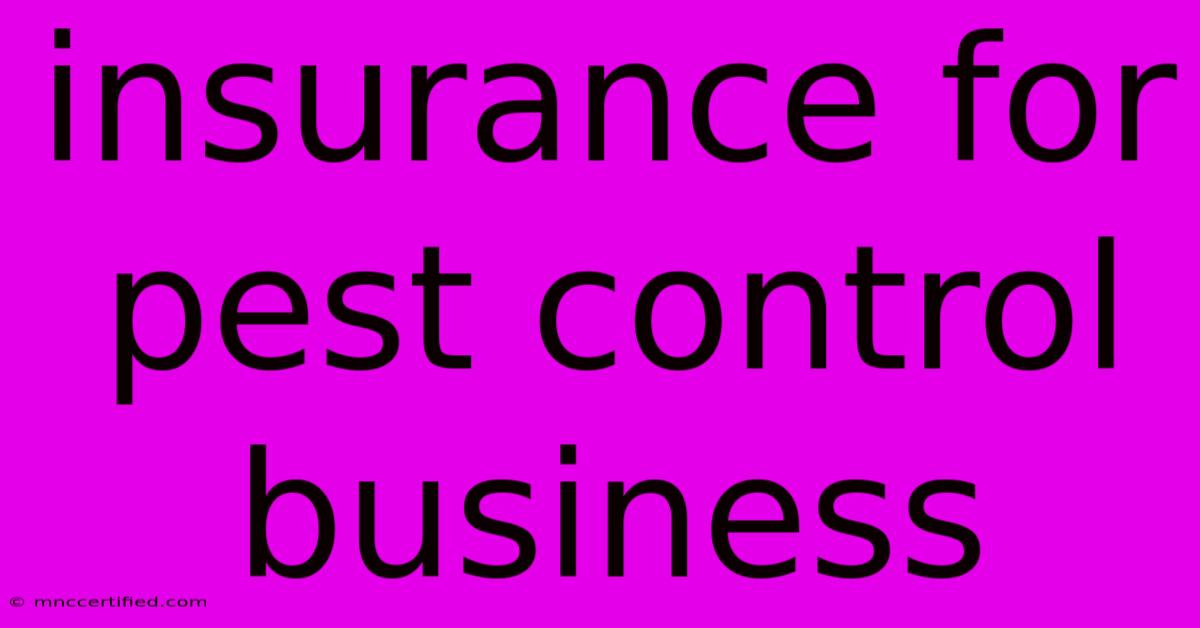Insurance For Pest Control Business

Table of Contents
Protecting Your Business: Insurance Essentials for Pest Control Professionals
Running a pest control business is a challenging yet rewarding endeavor. You're entrusted with protecting homes and businesses from unwanted critters, but you also need to safeguard your own business from potential risks. This is where insurance comes in. Having the right insurance coverage is crucial for any pest control professional, ensuring financial protection and peace of mind.
Understanding the Risks in Pest Control
The nature of your work presents a unique set of risks. Consider these potential hazards:
- Liability: Accidental property damage during treatment, allergic reactions to pesticides, or injuries caused by your equipment could lead to costly lawsuits.
- Employee Injury: Your technicians are exposed to various hazards, from chemical exposure to falls and accidents.
- Property Damage: Your vehicles, equipment, and business property are vulnerable to theft, fire, or natural disasters.
- Product Liability: If a pesticide you use causes damage or harm, you could be held liable.
Essential Insurance Policies for Pest Control Businesses
To navigate these risks, consider these essential insurance policies:
1. General Liability Insurance: This is a cornerstone of any business insurance plan. It provides coverage for third-party bodily injury or property damage caused by your business operations.
2. Workers' Compensation Insurance: This policy protects your employees in case of work-related injuries or illnesses. It covers medical expenses, lost wages, and disability benefits.
3. Commercial Auto Insurance: If your business uses vehicles, this policy protects you from liability in case of accidents, as well as covering damage to your vehicles.
4. Professional Liability (E&O) Insurance: This policy protects you from claims of negligence or errors in your professional services. It covers legal expenses and potential settlements if a client claims you misapplied pesticides or failed to address a pest problem effectively.
5. Property Insurance: Protect your business assets, including your building, equipment, and inventory, from damage due to fire, theft, vandalism, or natural disasters.
6. Product Liability Insurance: This policy covers you if a pesticide you use causes harm or damage, regardless of whether you're at fault.
7. Environmental Impairment Liability (EIL) Insurance: This coverage is crucial for businesses dealing with hazardous materials. It helps cover cleanup costs and related liabilities if your operations cause environmental contamination.
8. Cyber Liability Insurance: In today's digital world, this insurance protects you against data breaches, cyberattacks, and other digital threats that can harm your business.
9. Umbrella Insurance: This provides additional liability coverage on top of your existing policies, offering an extra layer of protection against significant claims.
Choosing the Right Insurance Coverage
1. Consult with a Specialist: Work with an insurance broker specializing in pest control businesses. They understand the unique risks and can tailor a policy to your specific needs.
2. Assess Your Risks: Consider the types of services you offer, the chemicals you use, the size of your business, and your employees' work environment to identify your biggest potential risks.
3. Compare Quotes: Get quotes from several reputable insurers and compare coverage, premiums, and deductibles.
4. Stay Informed: Keep abreast of changes in regulations and industry best practices. Stay connected with your insurer and make sure your policy is updated to reflect your business's evolving needs.
Maintaining Your Insurance Coverage
1. Accurate Documentation: Keep meticulous records of all your services, chemical applications, and client interactions. This documentation can be crucial in defending yourself against claims.
2. Ongoing Training: Ensure your technicians are trained on safe handling practices, proper chemical application techniques, and emergency response procedures.
3. Compliance with Regulations: Stay compliant with all state and federal regulations regarding pesticide use, environmental protection, and worker safety.
The Importance of Insurance for Growth
Having the right insurance protects your business, but it also allows you to grow and thrive. A solid insurance plan offers:
- Financial Security: Protects you from potentially crippling lawsuits or financial losses.
- Business Continuity: Minimizes disruption and downtime if you face a claim.
- Peace of Mind: Allows you to focus on running your business knowing you're protected.
- Client Confidence: Inspires trust and confidence in your clients, demonstrating your commitment to safety and professionalism.
Conclusion: Investing in the right insurance is a smart business decision for any pest control professional. By understanding your risks, obtaining appropriate coverage, and maintaining sound practices, you can protect your business and focus on providing exceptional service to your clients.

Thank you for visiting our website wich cover about Insurance For Pest Control Business. We hope the information provided has been useful to you. Feel free to contact us if you have any questions or need further assistance. See you next time and dont miss to bookmark.
Featured Posts
-
Trump Taps Noem For Homeland Security Role
Nov 13, 2024
-
Essential Staff Care Insurance Card
Nov 13, 2024
-
California Insurance License Number
Nov 13, 2024
-
Nhs To Offer Stop Smoking Pill
Nov 13, 2024
-
Can Massage Be Covered By Insurance
Nov 13, 2024